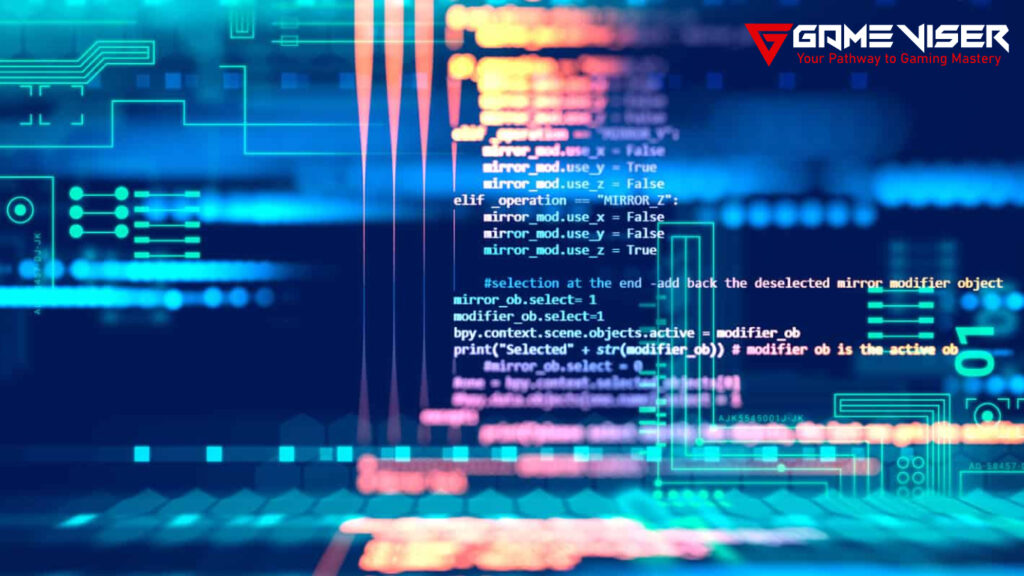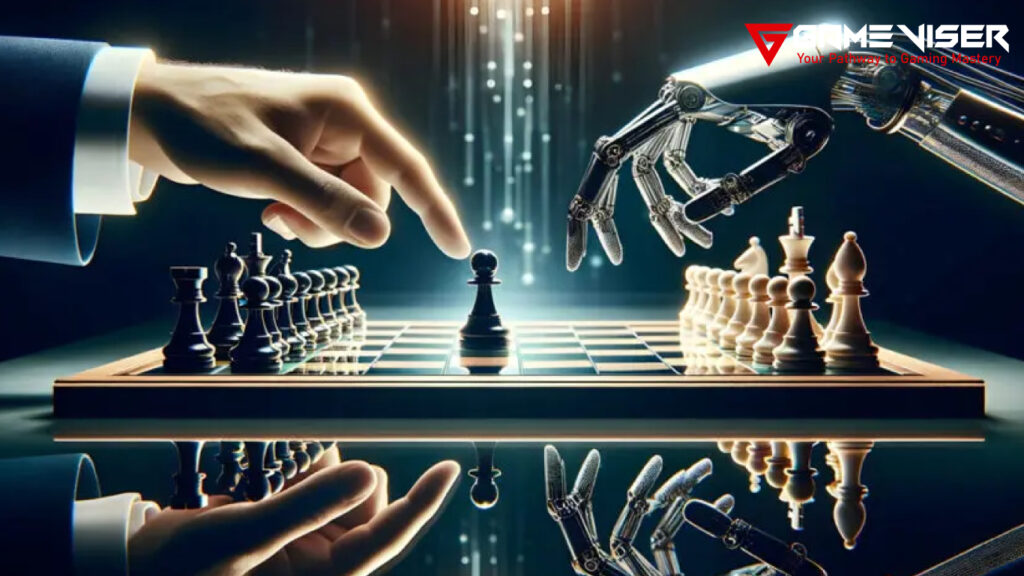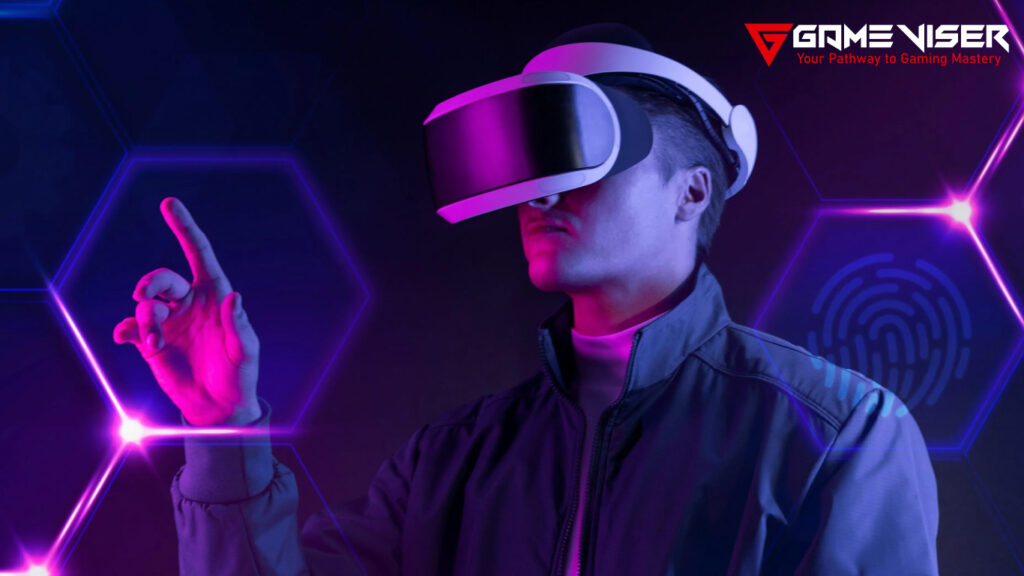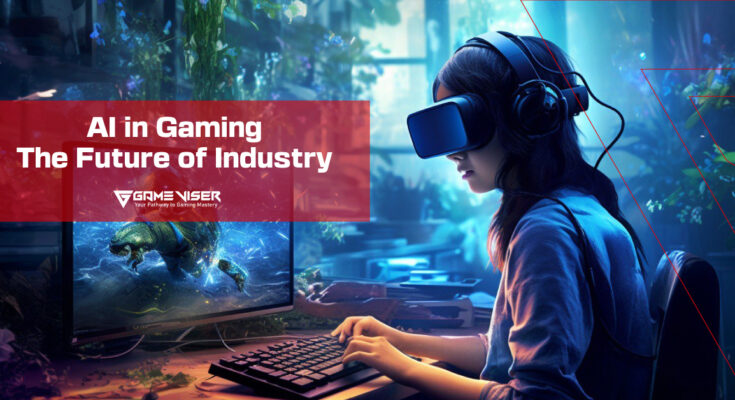AI is transforming every industry, including the gaming industry. NPCs are being trained through AI, and AI is also being used in game development. Let’s explore how AI is revolutionizing the gaming industry and how it is impacting both developers and players.
Table of Contents
Introduction to AI in Gaming
AI (Artificial Intelligence) was first introduced in 1956. However, a significant increase in the usage of AI in gaming was noticed in the 1980s when the renowned game PAC-MAN was released. This game used a simple AI model to control its iconic ghosts. Then in 1984, a space game called Elite was released, where developers used a procedural generation system to create its vast universes. Since then, AI has been used in the gaming industry. One of the most recent hot topics among gamers was the 40th anniversary of Microsoft Flight Simulator. The most recent version of this game uses AI to generate an extremely high-fidelity version of the real world, which includes more than 1.5 billion buildings.
Initially, AI’s role was limited to basic functionalities, such as controlling non-player characters (NPCs) and enabling simple gaming mechanics. But over time, there has been significant progress in the field of Artificial Intelligence. Advancements in Machine Learning and Neural Networks have elevated AI to another level. Now, AI has become a powerful tool that significantly impacts every aspect of gaming, from development to gameplay.
AI in Game Development
Procedural Content Generation (PCG)
There have been advancements in the field of Artificial Intelligence in recent years, which have led to AI being used in many fields, including game development. The most prominent application of AI in game development is Procedural Content Generation (PCG). PCG refers to the use of algorithms to automatically generate game content such as levels, maps, characters, items, quests, and even entire game worlds. This technique allows developers to create vast, varied, and dynamic content without manually designing each element. Through algorithms and AI-driven techniques, games can generate endless landscapes, levels, and scenarios that provide unique experiences every time a player engages with the game.
For example, games like No Man’s Sky use AI to generate an entire universe with over 18 quintillion planets, each with its own ecosystem, weather patterns, and terrains. Minecraft is another example where the game world is procedurally generated, enabling endless exploration of unique terrains.

Intelligent NPCs and Dynamic Game Balancing
Although the use of AI to control Non-Player Characters (NPCs) has been in use for a long time, advancements in AI have taken it to another level. Gone are the days when NPCs followed predictable patterns. Modern games have now introduced AI-driven NPCs that can learn from player behavior, adapt their strategies, and create more realistic interactions. This makes games more responsive. The AI is used to control NPCs allows them to communicate, plan ambushes, and react to player actions in real time.
Dynamic Game Balancing ensures that the game remains challenging and enjoyable for players of all skill levels. It uses AI to analyze player performance and adjust game difficulty in real time. For example, in Left 4 Dead, the AI Director adjusts the game by analyzing player performance. It decides when to spawn enemies and determines the availability of resources in the game.
AI and Player Experience
Personalization and Adaptive Difficulty Levels
AI in gaming offers personalized experiences to players. Through Machine Learning algorithms, AI can analyze a player’s in-game behavior, preferences, and skill levels to tailor the game accordingly. This includes specific missions, game content adjustments, and altering the storyline to align with the player’s interests. For example, Middle-Earth: Shadow of Mordor uses a Nemesis System that remembers the player’s actions and creates personalized interactions with enemy characters based on those actions.
Adaptive difficulty levels are now common in modern games. Instead of selecting a difficulty level at the start, the game automatically adjusts the difficulty in real time by observing the player’s performance. This gives the game a more realistic feel and makes it more engaging. For example, games like Resident Evil 4 use adaptive difficulty to change the number of enemies, their behavior, and the availability of resources depending on how well or poorly the player is performing.

Real-Time Analytics and Feedback
AI in gaming is used for real-time analytics and feedback. It allows games to adapt and evolve during gameplay. This could involve changing the environment of the game, providing tips, and altering the narrative based on player decisions. AI-driven analytics can also offer insights to developers about how players interact with the game, which can inform future updates and patches
AI in Game Testing
As discussed earlier, the use of AI in gaming has been a revolutionary step for the gaming industry. It has made many challenging tasks easier, such as the game testing process, which has become faster and more efficient. Traditionally, game testing required a significant amount of human resources and time. But AI testing tools have made the process easier by automatically identifying bugs, errors, and gameplay issues. AI can test different game paths, stress test the game environment, and provide real-time suggestions to improve game development. It can also predict issues before they arise. This not only speeds up the game development process but also ensures a higher-quality final product.
Role of AI in Virtual Reality and Augmented Reality
Augmented Reality (AR) overlays digital content onto the real world. AR games use the player’s environment as a backdrop, enhancing it with digital objects, characters, and information. Players interact with both physical and digital elements, often using mobile devices, AR glasses, and controllers. Virtual Reality (VR) creates a completely digital environment and replaces the real world with a fully virtual one. VR provides a 360-degree experience, with players surrounded by a virtual environment. VR transports players into a 3D world where they interact with the environment and objects as if they were physically present. Players use VR headsets and hand controllers to interact with the virtual world.

VR and AR are the future of the gaming industry, where AI plays a key role in their development. AI can be used in VR games to create adaptive environments that change based on player behavior. In AR, AI can help recognize and interact with real-world objects, blending the digital and physical worlds seamlessly.
Ethical Use and the Future of AI in Gaming
While AI brings numerous benefits to the gaming industry, it also raises ethical concerns. The use of AI in gaming can lead to issues such as data privacy, as AI often relies on vast amounts of player data to function effectively. There are also concerns about the potential for AI to create overly addictive gaming experiences, exploiting player behavior to maximize engagement.
The future of AI in gaming seems bright. AI-generated narratives, such as stories and player decisions, are increasingly surprising and are being used in modern games. AI-trained characters and NPCs that exhibit human-like emotions, reasoning, and learning capabilities have elevated the gaming experience to another level. Furthermore, advancements in game design, cross-platform AI technology, and concepts like never-ending maps are also impressive.
AI-Based Games and GTA VI
Modern Games Utilizing AI
| Game | AI Features | Details |
|---|---|---|
| The Last of Us Part II | Advanced NPC behavior with dynamic tactics | NPCs communicate, strategize, and adapt to player actions in real-time. |
| Realistic enemy reactions and adaptive combat strategies | ||
| Middle-Earth: Shadow of Mordor | Nemesis System | Orcs remember player interactions, hold grudges, seek revenge, and form personal relationships. |
| Left 4 Dead 2 | AI Director | Dynamically adjusts game difficulty based on player performance. |
| Controls the frequency of zombie spawns and the availability of resources. | ||
| No Man’s Sky | Procedural Content Generation | Creates diverse and expansive universes with unique ecosystems, flora, and fauna. |
| Resident Evil 4 | Adaptive difficulty levels | Adjusts enemy behavior, spawn rates, and resource availability to keep gameplay challenging. |
| Baldur’s Gate 3 | Dynamic NPC behavior, advanced combat AI, and branching dialogues | Manages realistic NPC interactions, combat tactics, and complex character dialogues. NPCs react to player actions and decisions. |
Expectations from GTA VI
Grand Theft Auto VI (GTA VI) is one of the most highly anticipated upcoming games, and it is expected to make significant use of AI technologies. While specific details about its AI implementations are still emerging, several aspects are anticipated.

- Advanced NPC Behavior
- GTA VI is expected to feature highly realistic NPCs with complex behaviors. This includes more natural interactions with the player, adaptive responses to player actions, and lifelike daily routines. NPCs may exhibit behaviors influenced by their surroundings, mood, and player actions.
- Dynamic World and Traffic Systems
- The game is likely to use AI to manage the dynamic world of the city, including traffic patterns, pedestrian movements, and environmental changes. This will contribute to a more realistic and living city where events and activities evolve based on the player’s actions and decisions.
- Adaptive Difficulty and Mission Design
- AI might be used to adjust mission difficulty based on player performance and choices. This could involve varying enemy tactics and altering mission objectives.
- Enhanced AI for Law Enforcement and Criminal Activities
- AI is expected to improve the behavior of law enforcement and criminal elements within the game. This includes more sophisticated AI for police pursuits, strategic planning by criminal gangs, and reactive responses to player actions during heists or criminal activities.
- Realistic Dialogue and Interaction
- AI could be used to create more natural and varied dialogue options, allowing for deeper interactions with characters. This might include branching conversations, emotional responses, and contextual dialogue that changes based on the player’s choices.
Expectations and Impact
- Open World Immersion: With AI-driven advancements, GTA VI aims to deliver a more immersive open world where every corner feels alive and responsive.
- Replayability: AI systems are expected to provide a varied experience each time the game is played, with different interactions, outcomes, and challenges.
- Realism and Complexity: The use of AI will contribute to a more realistic and complex game world, making the overall experience richer and more engaging.
While Rockstar Games has been relatively tight-lipped about specific AI details, the advancements in AI technology and the studio’s history of game design suggest that GTA VI will leverage AI to create a surprising experience in the open-world genre.
Conclusion
Artificial Intelligence (AI in Gaming) is revolutionizing the gaming industry. From intelligent NPCs to adaptive game worlds, AI has brought a new level of sophistication to game development and player experiences. However, as AI continues to evolve, it is essential to address the ethical concerns that come with it, ensuring that the technology is used responsibly and transparently. As we look to the future, the potential for AI in gaming seems limitless. With ongoing advancements in machine learning, neural networks, and computational power, AI in gaming is likely to bring even more new and surprising features for developers and players.
FAQs
How is AI in gaming being used?
AI in gaming is being used to improve NPC behavior, generate game content, adapt difficulty levels, and provide personalized experiences.
Which AI tool is used in gaming?
Common AI tools in gaming include machine learning algorithms, procedural generation systems, and AI-driven analytics.
Can an AI play a game?
Yes, AI can play games.
Is PUBG an AI game?
Yes, PUBG uses AI for NPC behavior, procedural content generation, and player matchmaking, but it is not solely an AI game.
What are AI in Gaming called?
AI in games is often referred to as NPC behavior systems, AI-driven mechanics, or game AI.
Is Call of Duty an AI game?
Call of Duty uses AI for enemy behavior and dynamic game elements, but it is not considered an AI game.
Will AI generate video games?
AI has the potential to assist in generating video games, including creating content and designing levels. Thus, AI in gaming is expected to take gaming industry to another level.
What are the disadvantages of AI in gaming?
Disadvantages of AI in gaming include potential loss of human touch, ethical concerns, and the risk of creating unbalanced gameplay.
Who invented AI?
AI was developed by various researchers, with key contributions from personalities like Alan Turing, John McCarthy, and Marvin Minsky.




